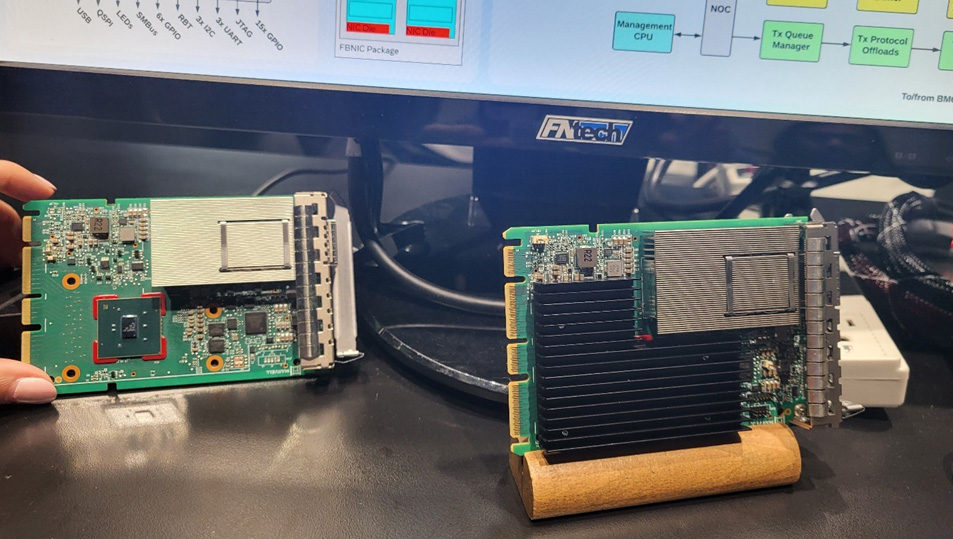

By Kirt Zimmer, Head of Social Media Marketing, Marvell

Marvell’s business is accelerated infrastructure for the AI era, which is a fast-evolving space that can occasionally confuse even the most earnest student. To help you keep up, we’ve partnered with VentureBeat to explore a multitude of content about that subject:
By Michael Kanellos, Head of Influencer Relations, Marvell
Computer architects have touted the performance and efficiency gains that can be achieved by replacing copper interconnects with optical technology in servers and processors for decades1.
With AI, it’s finally happening.
Marvell earlier this month announced that it will integrate co-packaged optics (CPO) technology into custom AI accelerators to improve the bandwidth, performance and efficiency of the chips powering AI training clusters and inference servers and opening the door to higher-performing scale-up servers.
The foundation of the offering is the Marvell 6.4Tbps 3D SiPho Engine announced in December 2023 and first demonstrated at OFC in March 2024. The 3D SiPho Engine effectively combines hundreds of components—drivers, transimpedance amplifiers, modulators, etc.—into a chiplet that itself becomes part of the XPU.
With CPO, XPUs will connect directly into an optical scale-up network, transmitting data further, faster, and with less energy per bit. LightCounting estimates that shipments of CPO-enabled ports in servers and other equipment will rise from a nominal number of shipments per year today to over 18 million by 20292.
Additionally, the bandwidth provided by CPO lets system architects think big. Instead of populating data centers with conventional servers containing four or eight XPUs, clouds can shift to systems sporting hundreds or even thousands of CPO-enhanced XPUs spread over multiple racks based around novel architectures—innovative meshes, torus networks—that can slash cost, latency and power. If supercomputers became clusters of standard servers in the 2000s, AI is shifting the pendulum back and turning servers into supercomputers again.
“It enables a huge diversity of parallelism schemes that were not possible with a smaller scale-up network domain,” wrote Dylan Patel of SemiAnalysis in a December article.
By Michael Kanellos, Head of Influencer Relations, Marvell
What happened in semis and accelerated infrastructure in 2024? Here is the recap:
1. Custom Controls the Future
Until relatively recently, computing performance was achieved by increasing transistor density à la Moore’s Law. In the future, it will be achieved through innovative design, and many of those innovative design ideas will come to market first—and mostly— through custom processors tailored to use cases, software environments and performance goals thanks to a convergence of unusual and unstoppable forces1 that quietly began years ago.

FB NIC on display at OFC
This article is the final installment in a series of talks delivered Accelerated Infrastructure for the AI Era, a one-day symposium held by Marvell in April 2024.
AI demands are pushing the limits of semiconductor technology, and hyperscale operators are at the forefront of adoption—they develop and deploy leading-edge technology that increases compute capacity. These large operators seek to optimize performance while simultaneously lowering total cost of ownership (TCO). With billions of dollars on the line, many have turned to custom silicon to meet their TCO and compute performance objectives.
But building a custom compute solution is no small matter. Doing so requires a large IP portfolio, significant R&D scale and decades of experience to create the mix of ingredients that make up custom AI silicon. Today, Marvell is partnering with hyperscale operators to deliver custom compute silicon that’s enabling their AI growth trajectories.
Why are hyperscale operators turning to custom compute?
Hyperscale operators have always been focused on maximizing both performance and efficiency, but new demands from AI applications have amplified the pressure. According to Raghib Hussain, president of products and technologies at Marvell, “Every hyperscaler is focused on optimizing every aspect of their platform because the order of magnitude of impact is much, much higher than before. They are not only achieving the highest performance, but also saving billions of dollars.”
With multiple business models in the cloud, including internal apps, infrastructure-as-a-service (IaaS), and software-as-a-service (SaaS)—the latter of which is the fastest-growing market thanks to generative AI—hyperscale operators are constantly seeking ways to improve their total cost of ownership. Custom compute allows them to do just that. Operators are first adopting custom compute platforms for their mass-scale internal applications, such as search and their own SaaS applications. Next up for greater custom adoption will be third-party SaaS and IaaS, where the operator offers their own custom compute as an alternative to merchant options.
![]()
Progression of custom silicon adoption in hyperscale data centers.
By Suhas Nayak, Senior Director of Solutions Marketing, Marvell

In the world of artificial intelligence (AI), where compute performance often steals the spotlight, there's an unsung hero working tirelessly behind the scenes. It's something that connects the dots and propels AI platforms to new frontiers. Welcome to the realm of optical connectivity, where data transfer becomes lightning-fast and AI's true potential is unleashed. But wait, before you dismiss the idea of optical connectivity as just another technical detail, let's pause and reflect. Think about it: every breakthrough in AI, every mind-bending innovation, is built on the shoulders of data—massive amounts of it. And to keep up with the insatiable appetite of AI workloads, we need more than just raw compute power. We need a seamless, high-speed highway that allows data to flow freely, powering AI platforms to conquer new challenges.
In this post, I’ll explain the importance of optical connectivity, particularly the role of DSP-based optical connectivity, in driving scalable AI platforms in the cloud. So, buckle up, get ready to embark on a journey where we unlock the true power of AI together.